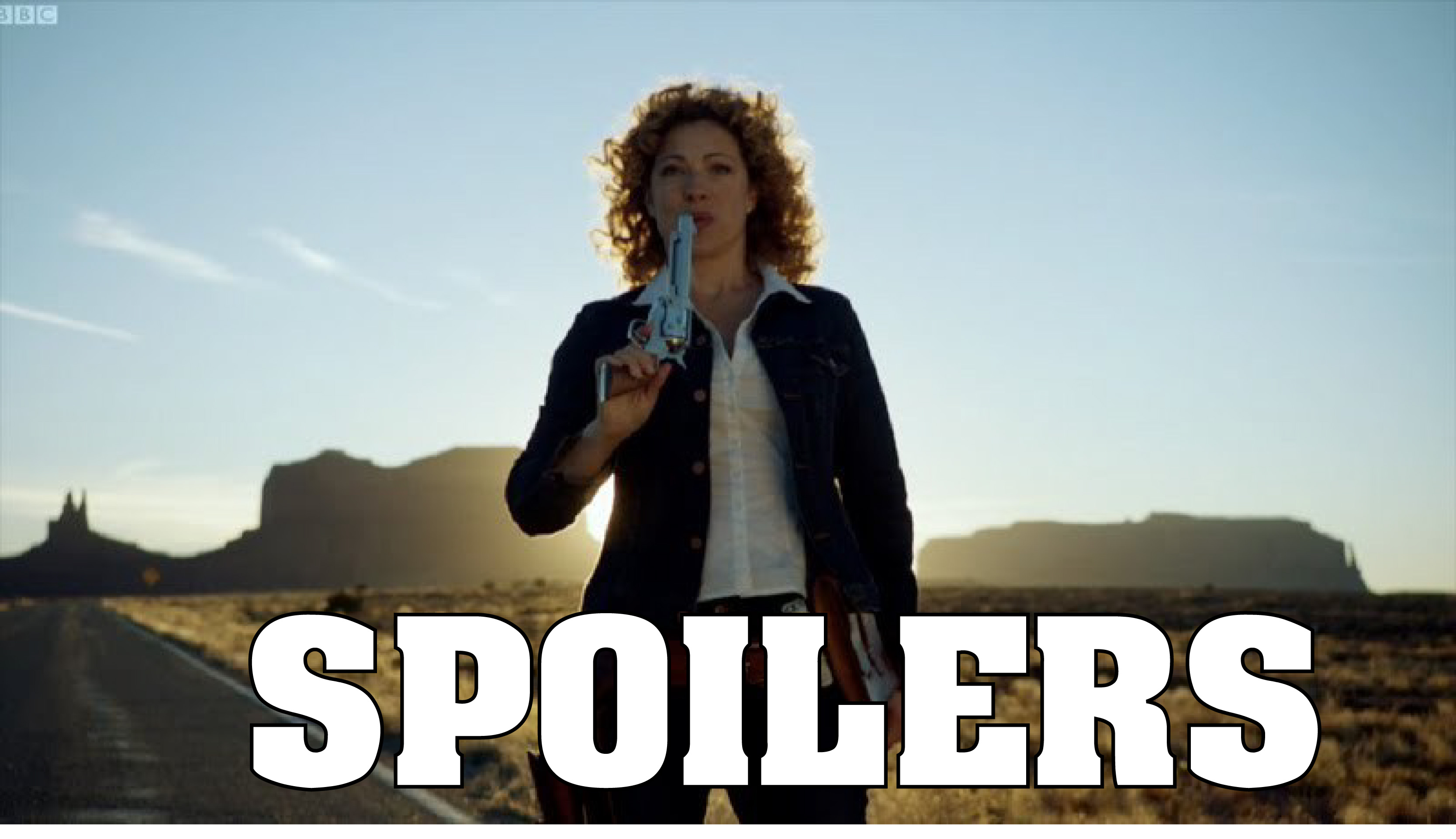Summary:
A soldier, Journey Blue, is rescued by The Doctor from her destroyed spaceship. Upon the return to her command ship, she brings The Doctor to tend to a patient, one that prompts The Doctor to fetch Clara from her teaching job. The two discover that the patient is odd in a number of ways: One, the patient is a Dalek and The Doctor's sworn enemy. Two, the Dalek is a good Dalek. The answers The Doctor seek can only be discovered when he heads Into the Dalek...
-------------------------------
My look into the new series of Doctor Who continues with the second episode of New Series 8/Season 34: Into the Dalek.
As I mentioned in my last review of the previous episode, Deep Breath, The Doctor in Doctor Who frequently battles threats against the innocent, be they aliens, robots, monstrosities etc. Last week's episode featured a relatively new enemy among the Doctor's gallery of baddies, but for this episode they decided to give us a truly classical foe and arguably the reason for Doctor Who's success in the first place: The Daleks.
The first on-screen appearance of the Daleks in 1963
The alien race known as the Daleks made their first appearance in the fifth episode/second serial of Season 1 in 1963. This serial, fittingly later titled The Daleks, featured The First Doctor and his three companions landing on an alien planet and helping an enslaved race overthrow their tyrannical dictators the Daleks. With simple tank-like designs, a cold & ruthless Nazi demeanor, and the iconic catchphrase "EXTERMINATE!", these villains that were intended to have a single appearance captured the hearts and minds of British audiences and became as much a component of pop culture as The Doctor himself.
While Doctor Who would later introduce other iconic enemies like The Cybermen, The Silurians, The Sea Devils and The Sontarans, to date The Daleks had the largest amount of episodes/specials dedicated to the threat they pose. Counting the most recent episode, the Daleks have been the subject of 31 stories. As a result, the Daleks got a lot of focus and development over decades, with the stories highlighting elements like their history, their culture, their purpose, and in some cases, unusual paradoxes. This episode is one such example, where a lone Dalek The Doctor meets is actually good...or is it?
Classic Series Dalek from 1963
Revived Series Dalek from 2005
The first appearance of the Daleks in the Revived Series in 2005
This episode is a good followup to Deep Breath and is the best episode of Series 8 so far. The shorter, 45 minute run allows for the story and characters to be tighter and straighter to the point. Each part in the story served its purpose, and no character feels left out or wasted. It continues the theme of The Doctor becoming much darker and seemingly uncaring in his 12th incarnation. While he is still out to do good, his methodology and application to accomplish his goals can be seen as skirting the line between good and evil. It is a concept seen in the Classic Series, but not so much in the Revived Series. Clara continues to be The Doctor's moral conscience and tries to keep up with the newer darker Doctor. And there is a new character, one that could potentially be a good one if he returns or if the Doctor's words hold true.
As always...
The episode as a whole takes place three weeks after Deep Breath. Past series of Doctor Who had a recurring element where The Doctor, despite being a time traveler, would be slightly off in his calculations and is caused either by himself accidentally or the stubbornness of his TARDIS. In this case, The Doctor went to get coffee for Clara after the end of last week's episode, but was held up. This episode also featured The Doctor traveling to space in the present day instead of the past, and he rescues a soldier named Journey Blue, whose spacecraft was under attack from a fleet of Dalek ships. Journey was a great one-off character; a soldier who did not take any nonsense and did her duty, but showed compassion when she needed to. It's almost a shame that she didn't become a permanent companion because The Doctor establishes that he has a general distaste for soldiers. Journey, in turn, takes The Doctor's callousness and uncaring demeanor the wrong way. A brief, but excellent, scene exemplifies this in the first 10 minutes of the episode. When The Doctor brings Clara on board Journey's command ship, Clara is introduced by The Doctor as "his carer" to Journey and her superior. This implies that The Doctor is a relatively uncaring individual, and is one of those things that shows how different The 12th Doctor is from his predecessors.
But yes, Journey not becoming a traveling companion robbed a great opportunity...or did it? This episode debuted a new character, one that has a lot going for him and has shades of possible future companionship with The Doctor. He is Danny Pink a fellow colleague of Clara at the school she teaches at. He is a former soldier who suffered from post-war trauma, but is socially awkward and starts developing a friendship with Clara. She takes Danny's awkwardness in stride and offers to buy him a drink and talk ,so much so that The Doctor notices briefly. All the scenes with Danny and Clara's subsequent friendship with the guy was a great part of the episode and could really set things up for him and The Doctor, if Danny will eventually become a companion aboard the TARDIS. Another highlight of the episode for me is when Clara confronts the Doctor and outright slaps him because he inadvertently caused a huge problem in the episode, yet The Doctor doesn't care. It shows the new companion dynamic with The Doctor and is reminiscent of Classic Doctor Who where The Doctor and the companions don't always get along.
Come to think of it, a lot of what we are seeing with the 12 Doctor has shades of the 1st Doctor:
The 1st Doctor and two teachers, 1963
William Hartnell and Peter Capaldi are both older men who signed to become The Doctor at 55.
The 1st and 12th Doctor have companions that teach at a school.
The school where Clara and Danny teach at is the same school where original companions Barbara and Ian taught at.
Capaldi's stories so far alternate between the past and present/future, just like Hartnell's did.
The 1st Doctor and the 12th Doctor share some characteristics and personality quirks.
The 12th Doctor and two teachers, 2014
Introducing these concepts to a new audience, or a cheap attempt at laziness & rehashing? YOU DECIDE.
Introducing these concepts to a new audience, or a cheap attempt at laziness & rehashing? YOU DECIDE.
A key conversation in the episode is done between The Doctor and Clara, where he asks her if "Am I a good man?". Clara, confused, simply says she doesn't know. This theme of whether or not The Doctor really is good is a focal point in the episode because of the conflict here. The Doctor, Clara, Journey and other soldiers head inside the patient Dalek (Called Rusty by The Doctor) to try and heal him and see if the Dalek truly is good. It transpires that it's not, and the internal radiation inside Rusty made him malfunction to the point where he was not acting like a Dalek; Rusty saw the beauty of stars being born, developed a conscience, and wanted to stop his own species from exterminating life. Through a series of events, The Doctor manages to bring Rusty back by showing the memories of stars being born and seeing The Doctor's own mind and beauty...until Rusty bears witness to the Doctor's hatred. In a chilling scene, The Doctor imparts his hatred of The Daleks onto Rusty and Rusty's turns his rampage onto his fellow invading Daleks, utterly annihilating the invading force.
The scene where Rusty departs and converses with The Doctor is extremely chilling and poignant. Rusty now is aware of what evil the Daleks can do and vows to stop them on his own, but also says to The Doctor that "He is a good Dalek". Not only does it imply that The Doctor could go just as bad if put in a bad situation, it can go even worse because The Doctor has the concept of both good and evil. It is this final scene that really cinches the episode for me. Here, The Doctor's iconic enemy judges him instead of the other way around, and concludes that The Doctor is not a good man, he is just simply aligned with good, and that he could turn evil just as easily. The idea of a Doctor with moral ambiguities has not been seen in full since the 9th Doctor, and it really is a welcome change. The 9th Doctor and New Series 1 also had an episode where The Doctor and a Dalek come to blows over their similar natures, and this could be seen as a spiritual sequel that makes it go full circle: The Doctor, for all his heroism, can be just as bad as the enemies he vanquishes.
Is he a good man?
Another plus I can give to the episode is the production design. It is filmed in such a way that it makes the environment the characters are in seem huge, which make sense as they are shrunken inside of a living being. While we've had episodes focusing on Daleks before, to my knowledge this is the first time where we actually see what goes on inside of a Dalek, right down to the antibodies. Kudos for giving the standard Dalek episode a twist.
The last thing to talk about is the over-arching mystery of Missy. Last episode, she appeared as a being who saved the man/robot that The Doctor may or may not have killed by bringing him to Paradise, a seemingly tranquil place where Heaven is made reality. To compound matters and make us wonder even more, one of the soldiers who travels with the characters inside Rusty sacrifices herself to allow The Doctor to accomplish his goals. In a flash of light, we think she is dead, but instead she is brought to Paradise by Missy. There are many speculations as to who Missy really is, and in true Doctor Who fashion, any theory that is presented by fans is totally plausible. Considering that Series 8 is said to have less over-arching stories and be more self contained, having a recurring mystery to seemingly tie things together and be more serialized is a plus. Huge props to the show for keeping the mystery alive and generating interest for the rest of the show in the hopes of seeing where the Missy mystery will go.
Final thoughts:
In closing, Into the Dalek is a most excellent episode. It promised exactly what Series 8 advertised the most: The Doctor not being the man he used to be and going down a darker, yet still heroic path. The episode really has that creepy factor because of it and it works to the show's advantage. It ties up some plot points brought up in earlier seasons, introduces a great new character, uses its running time to its advantage, and builds up a great mystery that could tie into The Doctor's darker nature. Its cons, namely a few slow moments, are outweighed by the great things brought up here. Would it be a cliche to say that I can't wait for next week's episode?
My score: 4.8/5







No comments:
Post a Comment